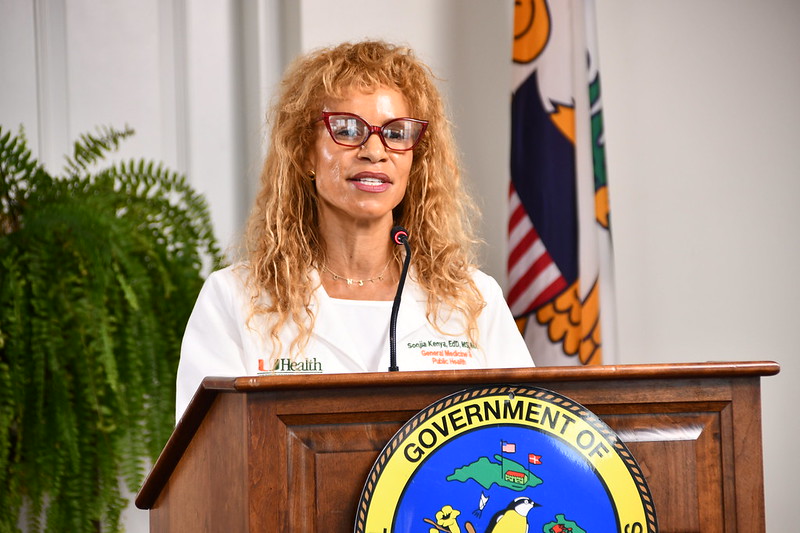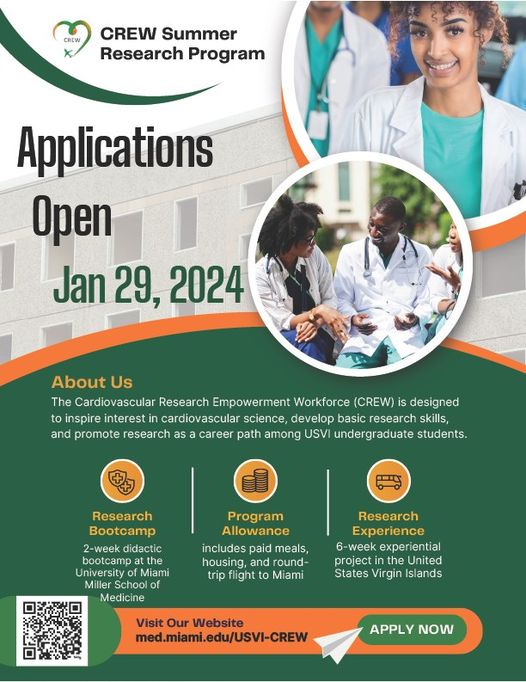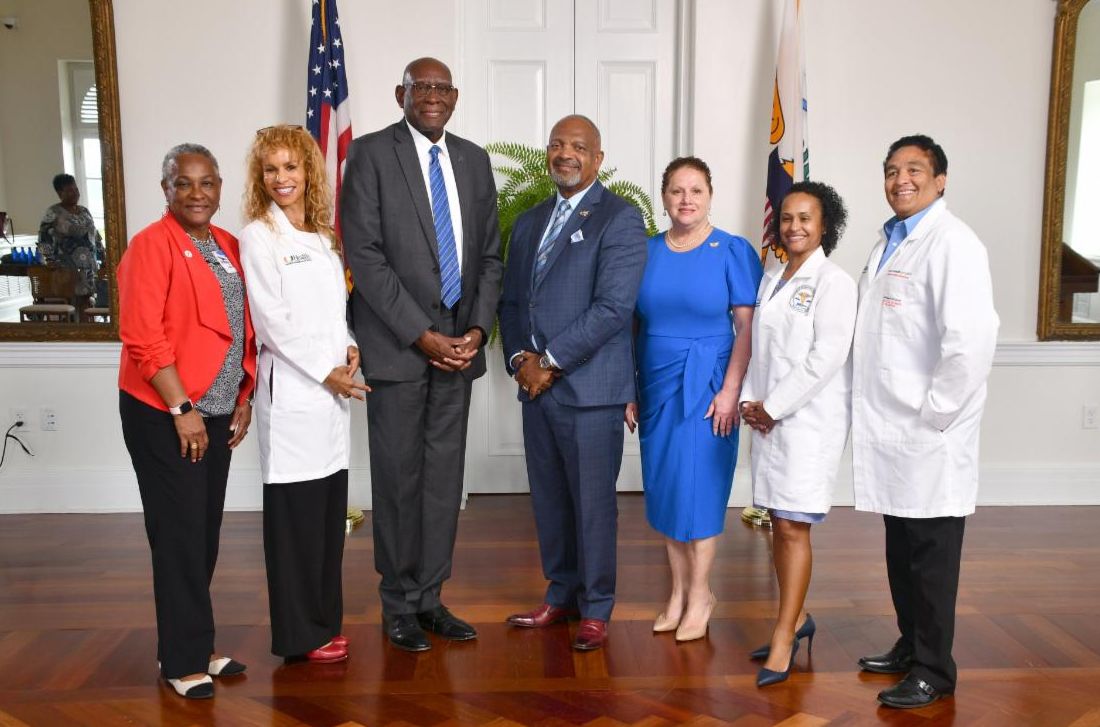CHRISTIANSTED — The U.S. Virgin Islands suffers some of the worst rates of adverse cardiovascular outcomes in the United States.
With more than 40 percent of healthcare positions vacant, the territory also experiences significant health care workforce shortages — and a majority of caregivers in the territory hail from outside the USVI — making delivery of local, culturally-tailored care challenging.
To help address these issues, public health experts with the University of Miami Miller School of Medicine have teamed up with the Virgin Islands Department of Health and the University of the Virgin Islands to create the Cardiovascular Research Empowerment Workforce (CREW) initiative.
Funded by the National Institutes of Health (NIH) National Heart, Lung, and Blood Institute, CREW recruits high school and undergraduate students born and/or raised in the USVI to participate in eight weeks of extensive research training to prepare and inspire them to pursue medical and/or research careers in cardiovascular medicine. The first cohort of students will begin in June of 2024.

Dr. Sonjia Kenya of the University of Miami-Miller School of Medicine discusses the Cardiovascular Research Empowerment Workforce (CREW) program. (Photo by Clara Freeman/Government House)
“This grant supports a summer fellowship to train diverse scholars in cardiovascular research and embed them into the USVI Department of Health, so they develop a strong connection with the USVI healthcare infrastructure and will want to come back after college to work within it,” said Sonjia Kenya, Ed.D., M.S., M.A., professor of general medicine and public health at the Miller School, who serves as CREW’s principal investigator.
Dr. Kenya said that she conceptualized the program, “with the goal of building more physician-scientists like Dr. Hunte-Ceasar, a Virgin Islander who trained under Dr. Kenya about 16 years ago, while she completed her master’s degree in public health at the Miller School. Dr. Hunte-Ceasar later returned to the USVI.
Today, representatives of the University of Miami’s Miller School of Medicine were part of a collaborative press conference, led by Lt. Governor Tregenza Roach, to unveil the CREW program. The event featured the participation of VI Health Commissioner Justa Encarnacion, Dr. David Hall, President of the University of the Virgin Islands, and Dr. Hunte-Ceasar.

Lt. Governor Roach noted that the University of Miami is one of the US’ top research universities with more than $400 million in research and sponsored program expenditures annually, and that the Miller School of Medicine is the No. 1 highest NIH-funded medical school in Florida. The school also boasts a student body that is among the most diverse in the United States.
“Today’s announcement of our partnership with University of Miami’s Miller School of Medicine could not have come at a more critical time. Cardiovascular disease remains the No. 1 cause of death and we must find a way to address it,” said Commissioner Encarnacion. “The USVI-UM partnership is a significant step toward this endeavor. Our partnership is about addressing the health of our Territory. It is about health equity and access to care here at home, and it is about beginning to rebuild a responsive and resilient healthcare workforce.”
Partnering with the UVI, the initiative will enroll 10 students each summer for the next five years. The students will complete two-week research “boot camp” at the Miller School and UM/Jackson Memorial Healthcare System and then a six-week component of the program in the USVI.
The NIH grant aimed fostering diversity in health-related research will fund CREW for $154,000 for five years.
During the press conference, Dr. Hall noted that the partnership aligns with the UVI’s vision, aiming to establish a robust medical school focused on training, research, and service simultaneously. He emphasized the collaborative nature of the project, acknowledging the need for partners, and expressed confidence that the partnership will propel them forward in achieving their goals.
“We need to improve the quality of healthcare where we live and one of the ways we do that is by training students who are here to, first, be interested in this dynamic field of medicine in general, to pursue it here, and even if they pursue someplace else, to come back here,” Dr. Hall said. “And so, this partnership is very consistent with the University’s overall goal that we have had for quite some time, and I would argue it is a step in the that direction.”
CREW seeks to develop more USVI physicians who stay and treat people in the USVI. “We want them to understand how to make sure a healthcare program is effective, well received by the community and culturally in tune with what the community needs,” said Dr. Kenya, who is also the associate director of the Behavioral Science Core at the Miami Center for AIDS Research (CFAR) and an officer in the Office of Diversity, Inclusion, and Community Engagement, among other roles, including research and education at the Miller School.
In addition to the ten new students who enter the CREW program each year, students will be invited to return to the program in subsequent years.
The Miller School is a perfect partner for this initiative, beyond its proximity to the USVI, said Dr. Kenya. CREW will take advantage of the Miller School’s supportive interdisciplinary research environment, including the Office of Diversity, the Florida Stroke Center, the Sleep Disorders Training Institute, and the Clinical and Translational Science Institute (CTSI).

